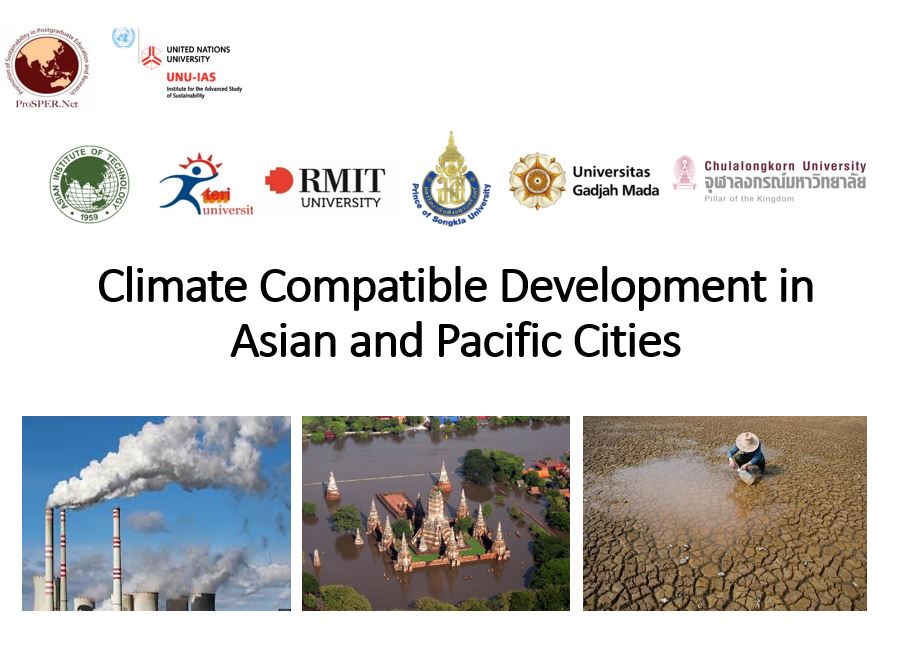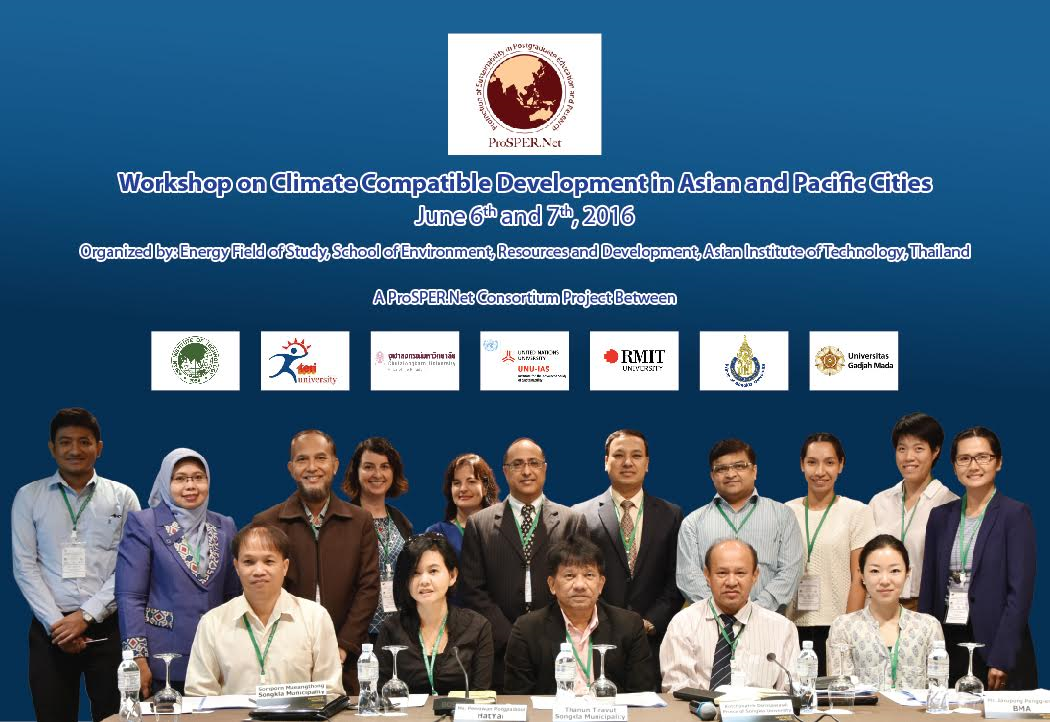- Duration: November 2014 ŌĆō┬ĀSeptember 2016
- Sponsor: Ministry of Environment Japan through Education for Sustainable Development (ESD) Programme of the United Nations University ŌĆō Institute for the Advanced Study of Sustainability (UNU-IAS), the secretariat for the Promotion of Sustainability in Postgraduate Education and Research Network (ProSPER.Net)
- Project Leader: Dr. Shobhakar Dhakal, Prof. S Kumar (AIT)
- Collaborators:┬Ā Dr. Susie Moloney (RMIT University), Dr. Hartmut Fuenfgeld,Dr Shaleen Singhal (TERI University), Dr. Chanathip Pharino (Chulalongkorn University), Dr. Eko Haryono (Universitas Gadjah Mada), Dr. Rotchanatch Darnsawasdi (Prince of Songkla University, Hatyai)
- Project Summary: Climate Compatible Development in Asian and Pacific cities, is the research project under the guidance of the Education for Sustainable Development (ESD) Programme of the United Nations University ŌĆō Institute for the Advanced Study of Sustainability (UNU-IAS), which is secretariat for the Promotion of Sustainability in Postgraduate Education and Research Network (ProSPER.Net). The project is funded by the Ministry of the Environment of Japan through UNU-IAS. Asian Institute of Technology is the core member of the consortium, and will undertake this project along with the partner institutions.┬ĀIn the current context, where thousands of cities are undertaking climate actions plans, both mitigation and adaptation have become the core elements of sustainable development. Urban decision makers in many cities are already pressed to mitigate GHGs emissions and climate risks simultaneously. In urban context, mitigation and adaptation are inter-connected through physical infrastructure planning, investment decisions and infrastructure costs, and phenomenon such as urban heat island, urban forests, passive heating and cooling in buildings and others. Therefore, the need for climate compatible development in cities are becoming more important than ever. In our project, we defined Climate Compatible Urban Development as the one which (a) emits less GHGs/mitigates more emissions (b) enhances carbon sinks (c) builds resilience and adapt to the impact of climate change, and (d) reduces mitigation burden outside of the city boundaries. We aim at understanding and illustrating their Driving force, State and Responses (under DSR Framework) in cities. Cities are often viewed in silos and a comprehensive understanding, including feedbacks between mitigation, adaptation and resilience are necessary. Additionally, a good question to ask is if cities are moving towards such climate compatible development pathways. Some kind of tools to track such development are essential as more and more thrusts are going into cities and there are little evidences of achievements from prevailing city actions. We propose that we look at different sectors in urban system, namely, energy, water, transport, food, shelter and other built infrastructures and explore climate compatible development path for these sectors. The overall objectives of our project are to:1. Foster the development of action plans and policies related to climate compatible urban development by initiating research to understand the state of climate compatible development of cities and their key challenges.
2. Develop a framework for tracking progress of climate compatible development of cities.
3. Explore ways of mitigating GHGs emissions and key climate impacts in the cities and incorporate them in the curriculum.
AIT hosted inter-university workshop titled ŌĆ£Climate compatible development of Asian and Pacific CitiesŌĆØ, on June 6 -7, in collaborations with ProSPER.Net consortium partner institutions: RMIT- Australia, TERI University-India, Gaja Madha University-Indonesia, Chulalongkorn University- Thailand, and Prince of Songkla University -HatYai Thailand. The objectives of the workshop was (1) to take stock of climate compatible development in cities, (2) to discuss potential indicators and framework to track progress on climate actions and (3) to discuss potential collaboration, concrete joint research topics or other joint activities among the partner institutions.
(In picture above, right to left (Back row: Dr. Chanathip Pharino, Ms. Sutida Sirimungkla, Ms. Kwanmanas
Meethavorn, Dr. Shaleen Singhal, Prof. Rajendra P. Shrestha, Dr. Shobhakar Dhakal, Ms. Heather McClaren, Dr. Susie Moloney, Dr. Eko Haryono, Ms. Cesaria Eka Yulianti Sri, Mr. Ashish Shrestha; Front row: Dr. Sohee Minsun Kim, Dr. Rotchanatch Darnsawasdi, Mr. Thanun Tiravut, Ms. Peerawan Pongpaibool, Mr. Somporn Mueangthong)
Presentations:
References for further reading:


